墙上的斑点 英文
- 格式:doc
- 大小:36.00 KB
- 文档页数:5
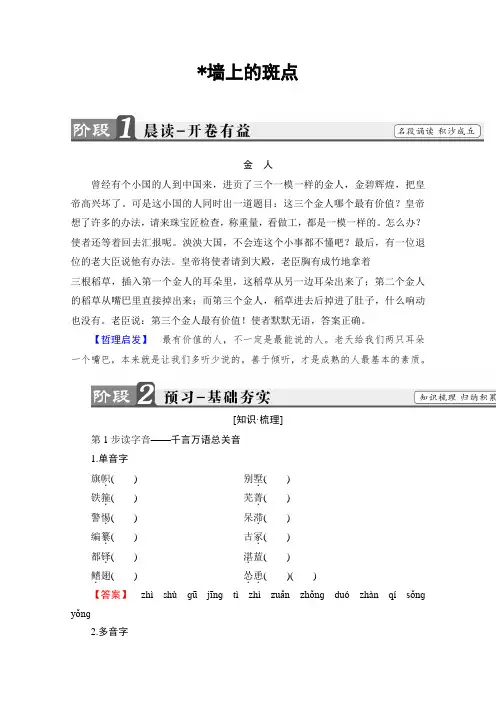
*墙上的斑点金人曾经有个小国的人到中国来,进贡了三个一模一样的金人,金碧辉煌,把皇帝高兴坏了。
可是这小国的人同时出一道题目:这三个金人哪个最有价值?皇帝想了许多的办法,请来珠宝匠检查,称重量,看做工,都是一模一样的。
怎么办?使者还等着回去汇报呢。
泱泱大国,不会连这个小事都不懂吧?最后,有一位退位的老大臣说他有办法。
皇帝将使者请到大殿,老臣胸有成竹地拿着三根稻草,插入第一个金人的耳朵里,这稻草从另一边耳朵出来了;第二个金人的稻草从嘴巴里直接掉出来;而第三个金人,稻草进去后掉进了肚子,什么响动也没有。
老臣说:第三个金人最有价值!使者默默无语,答案正确。
【哲理启发】最有价值的人,不一定是最能说的人。
老天给我们两只耳朵一个嘴巴,本来就是让我们多听少说的。
善于倾听,才是成熟的人最基本的素质。
[知识·梳理]第1步读字音——千言万语总关音1.单音字旗帜.() 别墅.()铁箍.() 芜菁.()警惕.() 呆滞.()编纂.() 古冢.()都铎.() 湛.蓝()鳍.翅() 怂恿..()()【答案】zhìshùɡūjīnɡtìzhìzuǎn zhǒnɡduózhàn qísǒnɡ yǒnɡ2.多音字壳⎩⎨⎧ ( )外壳( )甲壳 仆⎩⎨⎧( )女仆( )前仆后继 哄⎩⎨⎧ ()一哄而散()一哄而上( )哄骗 宿⎩⎨⎧ ( )宿营( )三天两宿( )星宿【答案】 ké qiào pú pū hòn ɡ hōnɡ hǒnɡ sù xiǔ xiù第2步写字形——奥妙无穷方块字⎩⎨⎧ 箭zú( )cù( )拥 ⎩⎨⎧ bān ( )点bān ( )级 ⎩⎨⎧ bì( )炉bì( )还 ⎩⎨⎧yàn ( )品义愤填yīnɡ( ) 【答案】 镞 簇 斑 班 壁 璧 赝 膺第3步用词语——送你一双慧眼1.证明·证实①上海几名网友,在工作之便利用公司内的专业设备,自测核辐射量并实时播报,以实测数据 ________(证明/证实)“我们的城市是安全的”。

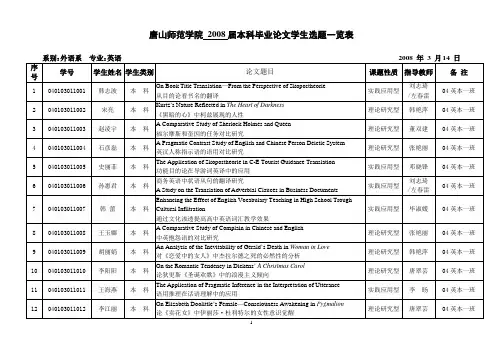
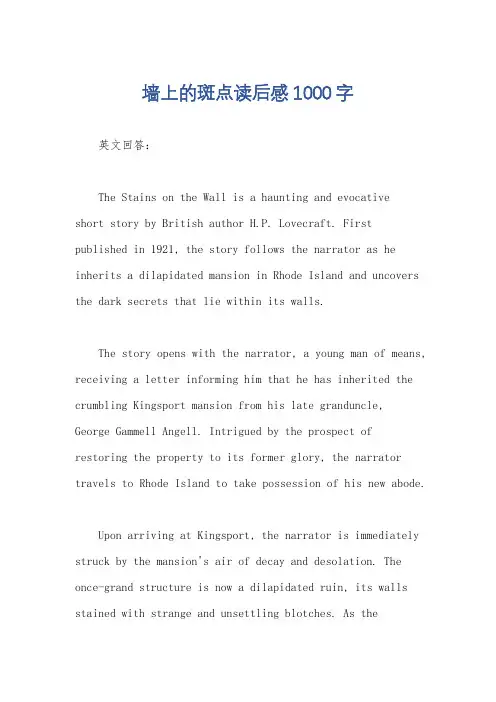
墙上的斑点读后感1000字英文回答:The Stains on the Wall is a haunting and evocativeshort story by British author H.P. Lovecraft. First published in 1921, the story follows the narrator as he inherits a dilapidated mansion in Rhode Island and uncovers the dark secrets that lie within its walls.The story opens with the narrator, a young man of means, receiving a letter informing him that he has inherited the crumbling Kingsport mansion from his late granduncle, George Gammell Angell. Intrigued by the prospect ofrestoring the property to its former glory, the narrator travels to Rhode Island to take possession of his new abode.Upon arriving at Kingsport, the narrator is immediately struck by the mansion's air of decay and desolation. The once-grand structure is now a dilapidated ruin, its walls stained with strange and unsettling blotches. As thenarrator explores the mansion, he uncovers a series of disturbing clues that hint at a sinister past.In the library, he discovers a collection of bizarre books, including volumes on ancient cults and forbidden knowledge. In the attic, he finds a strange painting depicting a group of hooded figures engaged in a ritual sacrifice. And in the basement, he stumbles upon a hidden room where he finds a journal written by his granduncle.The journal reveals a tale of horror and madness. Angell had become obsessed with the occult, and had conducted a series of experiments in the basement room. These experiments involved the summoning of ancient entities and the creation of strange and unnatural substances. The journal ends abruptly, with Angell's last entry written in a state of panic and terror.As the narrator delves deeper into the secrets of Kingsport, he begins to experience strange and unsettling events. He hears voices whispering in the walls, and sees shadows moving in the periphery of his vision. He alsobecomes increasingly aware of the stains on the walls, which seem to grow larger and more distinct each day.The narrator's sanity begins to unravel as he becomes increasingly consumed by the mansion's dark history. He becomes convinced that the stains on the walls are manifestations of the supernatural entities that Angell summoned. In a fit of desperation, he decides to destroy the stains, believing that this will free him from their influence.The narrator sets fire to the mansion, hoping to burn away the stains and the evil that lurks within. However, his efforts are in vain. The stains remain, and the mansion continues to stand, a testament to the horrors that have transpired within its walls.中文回答:《墙上的斑点》是英国著名恐怖小说作家霍华德·菲利普·洛夫克拉夫特创作的一篇令人难忘且引人入胜的短篇小说。
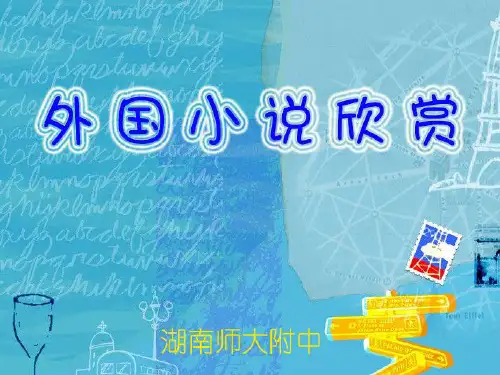
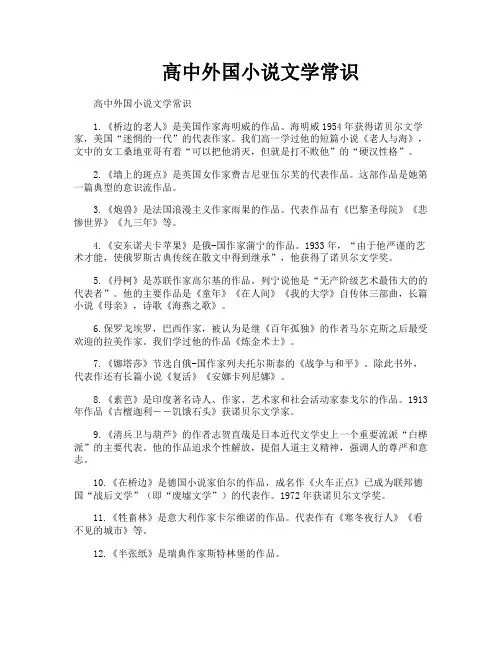
高中外国小说文学常识高中外国小说文学常识1.《桥边的老人》是美国作家海明威的作品。
海明威1954年获得诺贝尔文学家,美国“迷惘的一代”的代表作家。
我们高一学过他的短篇小说《老人与海》,文中的女工桑地亚哥有着“可以把他消灭,但就是打不败他”的“硬汉性格”。
2.《墙上的斑点》是英国女作家费吉尼亚伍尔芙的代表作品。
这部作品是她第一篇典型的意识流作品。
3.《炮兽》是法国浪漫主义作家雨果的作品。
代表作品有《巴黎圣母院》《悲惨世界》《九三年》等。
4.《安东诺夫卡苹果》是俄-国作家蒲宁的作品。
1933年,“由于他严谨的艺术才能,使俄罗斯古典传统在散文中得到继承”,他获得了诺贝尔文学奖。
5.《丹柯》是苏联作家高尔基的作品。
列宁说他是“无产阶级艺术最伟大的的代表者”。
他的主要作品是《童年》《在人间》《我的大学》自传体三部曲,长篇小说《母亲》,诗歌《海燕之歌》。
6.保罗戈埃罗,巴西作家,被认为是继《百年孤独》的作者马尔克斯之后最受欢迎的拉美作家。
我们学过他的作品《炼金术士》。
7.《娜塔莎》节选自俄-国作家列夫托尔斯泰的《战争与和平》。
除此书外,代表作还有长篇小说《复活》《安娜卡列尼娜》。
8.《素芭》是印度著名诗人、作家、艺术家和社会活动家泰戈尔的作品。
1913年作品《吉檀迦利――饥饿石头》获诺贝尔文学家。
9.《清兵卫与葫芦》的作者志贺直哉是日本近代文学史上一个重要流派“白桦派”的主要代表。
他的作品追求个性解放,提倡人道主义精神,强调人的尊严和意志。
10.《在桥边》是德国小说家伯尔的作品,成名作《火车正点》已成为联邦德国“战后文学”(即“废墟文学”)的代表作。
1972年获诺贝尔文学奖。
11.《牲畜林》是意大利作家卡尔维诺的作品。
代表作有《寒冬夜行人》《看不见的城市》等。
12.《半张纸》是瑞典作家斯特林堡的作品。
13.艾萨克什维斯辛格是美国犹太裔小说家,1978年的诺贝尔文学奖获得者。
我们学过他的短篇小说《山羊兹拉特》。
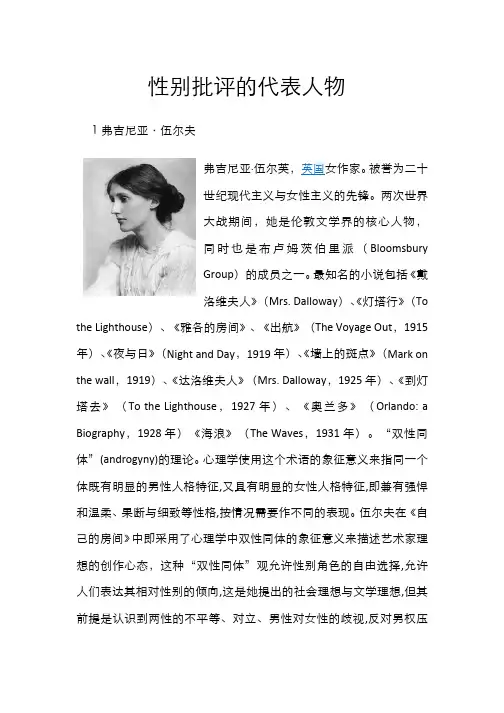
性别批评的代表人物1 弗吉尼亚·伍尔夫抑。
对于女性文学创作,伍尔夫认为女性写作的发展方向是“非个人化”写作。
这包括两层意思:第一,随着社会地位的提高和活动范围的扩大,女性的人际联系不再仅是感情的,而且也是知识的、政治的了。
因此她认为女性创作应从私人空间走向广阔的公共生活;第二,她呼吁“女人像女人那样写,但是像一个忘记自己是女人的女人”。
2西蒙 ·波伏娃3朱莉娅·克里斯蒂娃朱丽娅·克里斯蒂娃(生于1941年6月24日),保加利亚裔法国人,哲学家,文学批评家,精神分析师,女性主义者。
1969年,克利斯蒂瓦出版其第一著作《符号学》之后,在当今的国际批评分析、文化理论和女性主义领域开始产生影响。
她著述广泛,如《圣母悼歌》(1977)、《真实与现实》(1979)、《女性的时间》,另外还包括书籍、随笔和建筑意义出版物的序言,覆盖语言学、文学理论及批评、精神分析、传记及自传、政治和文学分析、艺术及艺术史。
首先分析语言上、文化上妇女被压抑、被排斥的地位,提出了针对男权中心具有颠覆性的符号学,并将符号学理论运用到分析男女二元对立的层次上。
克里斯蒂娃反对男性气质和女性气质的形而上学的划分,但她并不否认性别差异的存在。
在这个问题上,她的态度是不应仅凭作者的生物性别判断文本的革命性质,而应看他或她采取了什么样的主体立场。
因此,她不再徒劳地归纳文学作品中普遍的女性特征,而是打破了作者的男性女性之分, 她创立了自己的符号学理论来改造拉康的精神分析理论,解构男权社会坚不可摧的“象征秩序”。
她的目的就是要模糊父权制男女二元对立的界限从而起到颠覆父权制社会的作用。
4埃莱娜·西苏埃莱娜·西苏,法国当代最有影响力的小说家、戏剧家和文学理论家之一。
在法国和英美等国家,她以诸多实验创作和先锋理论而闻名。
1967年她发表了第一部小说《上帝的名字》(Le Prénom de Dieu)。
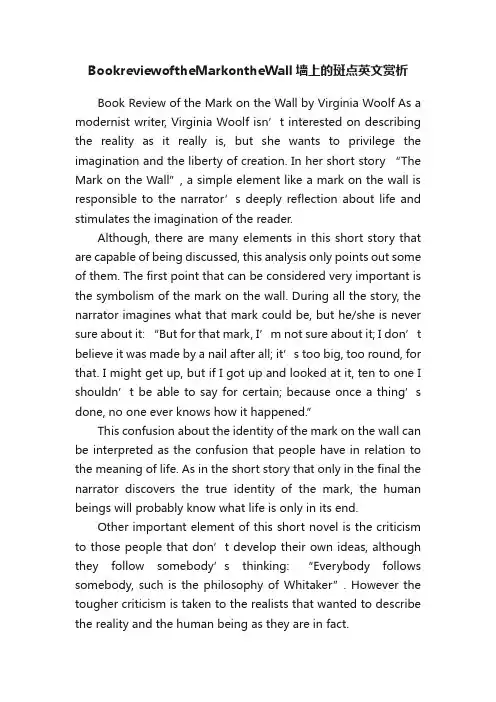
BookreviewoftheMarkontheWall墙上的斑点英文赏析Book Review of the Mark on the Wall by Virginia Woolf As a modernist writer, Virginia Woolf isn’t interested on describing the reality as it really is, but she wants to privilege the imagination and the liberty of creation. In her short story “The Mark on the Wall”, a simple element like a mark on the wall is responsible to the narrator’s deeply reflection about life and stimulates the imagination of the reader.Although, there are many elements in this short story that are capable of being discussed, this analysis only points out some of them. The first point that can be considered very important is the symbolism of the mark on the wall. During all the story, the narrator imagines what that mark could be, but he/she is never sure about it: “But for that mark, I’m not sure about it; I don’t believe it was made by a nail after all; it’s too big, too round, for that. I might get up, but if I got up and looked at it, ten to one I shouldn’t be able to say for certain; because once a thing’s done, no one ever know s how it happened.”This confusion about the identity of the mark on the wall can be interpreted as the confusion that people have in relation to the meaning of life. As in the short story that only in the final the narrator discovers the true identity of the mark, the human beings will probably know what life is only in its end.Other important element of this short novel is the criticism to those people that don’t develop their own ideas, although they follow somebody’s thinking: “Everybody follows somebo dy, such is the philosophy of Whitaker”. However the tougher criticism is taken to the realists that wanted to describe the reality and the human being as they are in fact.This literary pattern was very discussed by the modernists, because they defend that the reality and the man are changing all the time and it would be impossible to prove or know something in its totality. Even for a individual, it is difficult to know himself/herself deeply, for the reason that anyone has the certain about his/her attitude in front of a big problem, for example.This point of view of the modernists can be verified in some parts of this story, such as the moment that the narrator questions the reality and even himself/herself: “No, no nothing is proved, nothing is known”,“ Where was I ? What has it al l been about? A tree? A river? The Downs? Whitaker’s Almanack? The fields of a asphodel? I ca n′t remember a thing. Everything i s moving, falling, slipping, vanishing…”Finally, the last important aspect of this short story that will be discussed is the criticism to the religion, that always imposes its dogma and people have to follow it, without questioning. This manipulation of ideas is deeply criticized by modernists, because it contradicts the liberty and the power of creation. In fact not only the religion is censured by the modernism, but as it was said before, every person that doesn’t have his/her own ideas and accept opinions and discourses pre-constructed by someone else.In The Mark on the Wall, the sensitive female writer Virginia Woolf opened the curtain to a new world in novel writing——stream of consciousness, which is an literal trend in the early 20th century and regarded as the beginning of the modernist writing.Some people may take The Mark on the Wall as a boring novel which consists of the writer’s free thinking touched by a common mark on the wall. Throughout the whole story, the heroine tries to figure out what the mark is six times and herthought starts from the mark on the wall and comes back to it after a series of wild flowing. If the whole novel is just some kind of a woman’s stream of consciousness, why should we take it seriously?As far as I am concerned, the stream of consciousness novel The Mark on the Wall is significant in so many ways. In it readers could enjoy the journey of her floating minds, listen to a female voicing their long-lasting confusing and smell the fragrance of philosophy thinking.Firstly, being a stream of consciousness novel, it takes us into a journey of observing human bei ng’s inner world. Focusing on people’s stream of consciousness, Woolf reveals the flickering of that inner flame which flashes its messages through the brain. Her sensitivity and intelligence provides us a different spiritual world from her contemporaneous male writers. So I should say that one of the significances of The Mark on the Wall is that it allows us to appreciate our floating minds by her sensitive thoughts and words.Secondly, Woolf shows us some of her feminism thoughts in the novel The Mark on the Wall. “If it were not for Whitaker's Almanac--if it were not for the Table of P recedency”, “This train of thought, she perceives, is threatening mere waste of energy, even some collision with reality, for who will ever be able to lift a finger against Whitaker's Table of Precedency?”We can draw her thinking of equality between human beings from these sentences, and so is the equality between man and woman, which is her repeated theme in her literature works. In one word, this novel not only shows Woolf’s concern with human’s inner world, but also with females whose voice is always not paid attention to.Last but not the least; the whole passage gives an exhaustive view of Woolf’s philosophy thinking. “How rea dily our thoughts swarm upon a new object, lifting it a little way, as ants carry a blade of straw so feverishly, and then leave it. . .”, which I can’t agree more. And such sentences are all about the novel.To sum up, Woolf’s short novel The Mark on the Wall is of great significance, and it is a start, from which she starts to voice a female’s thinking out loud.。
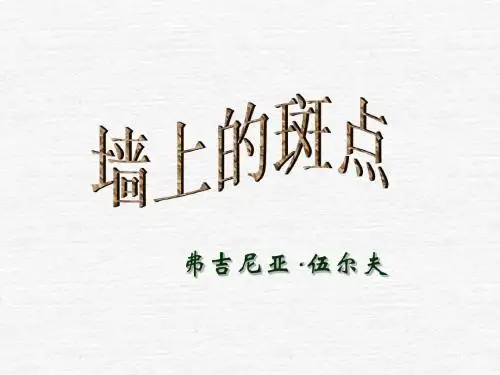
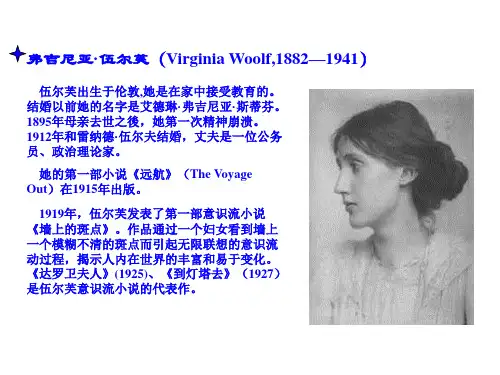
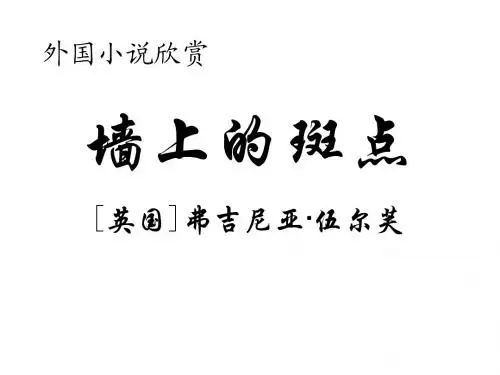
低成本快速获取客户之道经济危机以来,竞争越来越激烈,通过粗放的广告带来的自然客户流越来越少,在这种情况下,谁能以更低的成本获取客户,谁就能在危机中迅速成长,抢占市场份额。
靠传统的广告投放模式,获得快速成功的好日子已经一去不复返。
不仅仅是B2B的领域,地产、汽车、培训、金融、奢侈品、IT等行业都不得不把营销重心从前端的广告投放,转移到客户获取。
多少营销费用方能获得一个客户到访、试驾、免费课程、呼入电话等?走了弯路的电子商务的创业者们发现,如果把投资的关注点从广告转移到推广获得流量和点击量,给企业带来的不只是一条行销途径其背后更获得了切实的盈利。
倘若这时你眼里还只有传统意义上的广告,广告费投入不少屡不见效果,那你也真是活该被时代“out”了。
通过我们接触的客户和做过的案例,我们发现营销者高成本获取客户有以下几种方式,我们也针对性地为客户提供的有效的解决方案:1) 花拳秀腿:广告看似很漂亮,媒体也很强势,但是带不来多少反馈和客流,至于品牌价值提升了多少,天知道。
协动解决方案:建议将推广型广告转换成销售型广告,通过电话,网站和优惠等手段,让广告直接带来销售,就像电视购物,通过媒体带来的销售量评估媒体和广告创意的价值,并不断的优化与调整。
中国定制家具网甚至通过协动的分账平台,与媒体开展按照销售额后付费的广告投放模式。
2) 独胆英雄:销售人员投入50%以上的时间和精力,独自苦寻潜在客户,另外的30%的时间通过电话和拜访过滤客户,只有剩下的20%的时间在做销售人员最应该做,也最擅长的事情------跟意向客户合作促进成交,签单。
同电话,网站,邮件等比较,销售人员是最昂贵的营销渠道,这是营销资源的巨大浪费。
本文是“笑傲人生 ^-^ 创业指南”类关于“如何和客户拉关系-拉关系的诀窍”的文章,如果您还想了解其他人生相关内容,请在网站的文章分类等栏目中查找。
也许您是淘宝卖家,也许您是实业公司的推销员,也许您是一名业务经理,您所要做的重中之重就是和客户拉好关系,在好的产品,没有客户支持也是没有价值的产品,所以这就彰显了与客户沟通的重要性,小编在这里为您精心整理了与客户拉关系的技巧,希望对您有所帮助。
开题报告伍尔夫《墙上的斑点》中的意识流写作分析姓名:陈静系别:外语系班级:110302伍尔夫《墙上的斑点》中的意识流写作分析一、课题研究的目的和意义弗吉尼亚〃伍尔夫,英国著名意识流小说家,也是著名的评论家和杂文家。
在英国文学历史上,以伍尔夫为代表的意识流创作彻底颠覆了传统小说的写作手法,标志着英国文学的又一个高峰。
《墙上的斑点》是她的第一篇意识流小说,描写主人公从看到墙上有一个斑点而引发的一连串漫无边际的遐想。
后来发现,那个斑点不过是趴在墙上的一只蜗牛。
正是通过描述小说人物头脑中的这种意识流动的状况,来表现他所认为的人类真正的生活状态。
本文试从小说中人物思想意识的活动出发,对伍尔夫在《墙上的斑点》这部代表作中使用的内心独白、时间蒙太奇手法和视角转述方式这三种技巧作一浅析,目的是为了探讨她如何娴熟地使用意识流技巧来达到她表现生活的目的,以及为了探讨在成功地运用意识流技巧写作的同时注意突出自己的个性,通过这些意识的细致描写来让读者更深刻的认识到生活的真正的状态。
通过对《墙上的斑点》小说中意识流写作手法的研读逐渐意识到,本课题蕴涵着深刻的哲理和意义。
其意义在于呼吁人们追求真正的生活,追求自由,追求自己的理想和对人生的真正的思索。
二、文献综述《墙上的斑点》作为伍尔夫的第一篇意识流小说,也是伍尔夫一部特色鲜明的代表作,伍尔夫终身致力于小说写作的形式与技巧的研究,以娴熟的技巧与对人物的精神世界颇有新意的描写当之无愧的成为意识流写作大师。
崇斯伟在从《墙上的斑点》看伍尔夫的意识流短篇小说写作一文中指出伍尔夫娴熟的意识流使用技巧被刻画的淋漓尽致,她早期的创作风格和艺术特色也充分的展现了出来。
正是从《墙》开始,她对人物的内心活动进行了细致而又富有创新的描写,开始捕捉人生“重要的瞬间”。
虽然《墙》一文没有以后伍尔夫的长篇意识流小说的艺术成就大,但是它无论在艺术形式上还是创作风格上的都是对以往传统小说的重大突破。
王晗在论意识流技巧在伍尔夫《墙上的斑点》中的运用中对小说中的意识流写作手法进行了分析,并且对意识流中的内心独白手法进行了详细的解释,通过对人物思想活动的进一步剖析,让读者体会到了生活的真正的主题。
THE MARK ON THE WALLPerhaps it was the middle of January in the present that I first looked up and saw the mark on the wall. In order to fix a date it is necessary to remember what one saw. So now I think of the fire; the steady film of yellow light upon the page of my book; the three chrysanthemums in the round glass bowl on the mantelpiece. Yes, it must have been the winter time, and we had just finished our tea, for I remember that I was smoking a cigarette when I looked up and saw the mark on the wall for the first time. I looked up through the smoke of my cigarette and my eye lodged for a moment upon the burning coals, and that old fancy of the crimson flag flapping from the castle tower came into my mind, and I thought of the cavalcade of red knights riding up the side of the black rock. Rather to my relief the sight of the mark interrupted the fancy, for it is an old fancy, an automatic fancy, made as a child perhaps. The mark was a small round mark, black upon the white wall, about six or seven inches above the mantelpiece.How readily our thoughts swarm upon a new object, lifting it a little way, as ants carry a blade of straw so feverishly, and then leave it. . . If that mark was made by a nail, it can't have been for a picture, it must have been for a miniature--the miniature of a lady with white powdered curls, powder-dusted cheeks, and lips like red carnations. A fraud of course, for the people who had this house before us would have chosen pictures in that way--an old picture for an old room. That is the sort of people they were--very interesting people, and I think of them so often, in such queer places, because one will never see them again, never know what happened next. They wanted to leave this house because they wanted to change their style of furniture, so he said, and he was in process of saying that in his opinion art should have ideas behind it when we were torn asunder, as one is torn from the old lady about to pour out tea and the young man about to hit the tennis ball in the back garden of the suburban villa as one rushes past in the train.But as for that mark, I'm not sure about it; I don't believe it was made by a nail after all; it's too big, too round, for that. I might get up, but if I got up and looked at it, ten to one I shouldn't be able to say for certain; because once a thing's done, no one ever knows how it happened. Oh! dear me, the mystery of life; The inaccuracy of thought! The ignorance of humanity! To show how very little control of our possessions we have--what an accidental affair this living is after all our civilization--let me just count over a few of the things lost in one lifetime, beginning, for that seems always the most mysterious of losses--what cat would gnaw, what rat would nibble--three pale blue canisters of book-binding tools? Then there were the bird cages, the iron hoops, the steel skates, the Queen Anne coal-scuttle, the bagatelle board, the hand organ--all gone, and jewels, too. Opals and emeralds, they lie about the roots of turnips. What a scraping paring affair it is to be sure! The wonder is that I've any clothes on my back, that I sit surrounded by solid furniture at this moment. Why, if one wants to compare life to anything, one must liken it to being blown through the Tube at fifty miles an hour--landing at the other end without a single hairpin in one's hair! Shot out at the feet of God entirely naked! Tumbling head over heels in the asphodel meadows like brown paper parcels pitched down a shoot in the post office! With one's hair flying back like the tail of a race-horse. Yes, that seems to express the rapidity of life, the perpetual waste and repair; all so casual, all so haphazard. . . But after life. The slow pulling down of thick green stalks so that the cup of the flower, as it turns over, deluges one with purple and red light. Why, after all, should one not be born thereas one is born here, helpless, speechless, unable to focus one's eyesight, groping at the roots of the grass, at the toes of the Giants? As for saying which are trees, and which are men and women, or whether there are such things, that one won't be in a condition to do for fifty years or so. There will be nothing but spaces of light and dark, intersected by thick stalks, and rather higher up perhaps, rose-shaped blots of an indistinct colour--dim pinks and blues--which will, as time goes on, become more definite, become--I don't know what. . .And yet that mark on the wall is not a hole at all. It may even be caused by some round black substance, such as a small rose leaf, left over from the summer, and I, not being a very vigilant housekeeper--look at the dust on the mantelpiece, for example, the dust which, so they say, buried Troy three times over, only fragments of pots utterly refusing annihilation, as one can believe.The tree outside the window taps very gently on the pane. . . I want to think quietly, calmly, spaciously, never to be interrupted, never to have to rise from my chair, to slip easily from one thing to another, without any sense of hostility, or obstacle. I want to sink deeper and deeper, away from the surface, with its hard separate facts. To steady myself, let me catch hold of the first idea that passes. . . Shakespeare. . . Well, he will do as well as another. A man who sat himself solidly in an arm-chair, and looked into the fire, so--A shower of ideas fell perpetually from some very high Heaven down through his mind. He leant his forehead on his hand, and people, looking in through the open door,--for this scene is supposed to take place on a summer's evening--But how dull this is, this historical fiction! It doesn't interest me at all. I wish I could hit upon a pleasant track of thought, a track indirectly reflecting credit upon myself, for those are the pleasantest thoughts, and very frequent even in the minds of modestmouse-coloured people, who believe genuinely that they dislike to hear their own praises. They are not thoughts directly praising oneself; that is the beauty of them; they are thoughts like this:"And then I came into the room. They were discussing botany. I said how I'd seen a flower growing on a dust heap on the site of an old house in Kingsway. The seed, I said, must have been sown in the reign of Charles the First. What flowers grew in the reign of Charles the First?" I asked--(but, I don't remember the answer). Tall flowers with purple tassels to them perhaps. And so it goes on. All the time I'm dressing up the figure of myself in my own mind, lovingly, stealthily, not openly adoring it, for if I did that, I should catch myself out, and stretch my hand at once for a book in self-protection. Indeed, it is curious how instinctively one protects the image of oneself from idolatry or any other handling that could make it ridiculous, or too unlike the original to be believed in any longer. Or is it not so very curious after all? It is a matter of great importance. Suppose the looking glass smashes, the image disappears, and the romantic figure with the green of forest depths all about it is there no longer, but only that shell of a person which is seen by other people--what an airless, shallow, bald, prominent world it becomes! A world not to be lived in. As we face each other in omnibuses and underground railways we are looking into the mirror that accounts for the vagueness, the gleam of glassiness, in our eyes. And the novelists in future will realize more and more the importance of these reflections, for of course there is not one reflection but an almost infinite number; those are the depths they will explore, those the phantoms they will pursue, leaving the description of reality more and more out of their stories, taking a knowledge of it for granted, as the Greeks did and Shakespeare perhaps--but these generalizations are very worthless.The military sound of the word is enough. It recalls leading articles, cabinet ministers--a whole class of things indeed which as a child one thought the thing itself, the standard thing, the real thing, from which one could not depart save at the risk of nameless damnation. Generalizations bring back somehow Sunday in London, Sunday afternoon walks, Sunday luncheons, and also ways of speaking of the dead, clothes, and habits--like the habit of sitting all together in one room until a certain hour, although nobody liked it. There was a rule for everything. The rule for tablecloths at that particular period was that they should be made of tapestry with little yellow compartments marked upon them, such as you may see in photographs of the carpets in the corridors of the royal palaces. Tablecloths of a different kind were not real tablecloths. How shocking, and yet how wonderful it was to discover that these real things, Sunday luncheons, Sunday walks, country houses, and tablecloths were not entirely real, were indeed half phantoms, and the damnation which visited the disbeliever in them was only a sense of illegitimate freedom. What now takes the place of those things I wonder, those real standard things? Men perhaps, should you be a woman; the masculine point of view which governs our lives, which sets the standard, which establishes Whitaker's Table of Precedency, which has become, I suppose, since the war half a phantom to many men and women, which soon--one may hope, will be laughed into the dustbin where the phantoms go, the mahogany sideboards and the Landseer prints, Gods and Devils, Hell and so forth, leaving us all with an intoxicating sense of illegitimate freedom--if freedom exists. . . In certain lights that mark on the wall seems actually to project from the wall. Nor is it entirely circular. I cannot be sure, but it seems to cast a perceptible shadow, suggesting that if I ran my finger down that strip of the wall it would, at a certain point, mount and descend a small tumulus, a smooth tumulus like those barrows on the South Downs which are, they say, either tombs or camps. Of the two I should prefer them to be tombs, desiring melancholy like most English people, and finding it natural at the end of a walk to think of the bones stretched beneath the turf. . . There must be some book about it. Some antiquary must have dug up those bones and given them a name. . . What sort of a man is an antiquary, I wonder? Retired Colonels for the most part, I daresay, leading parties of aged labourers to the top here, examining clods of earth and stone, and getting into correspondence with the neighbouring clergy, which, being opened at breakfast time, gives them a feeling of importance, and the comparison of arrow-heads necessitates cross-country journeys to the county towns, an agreeable necessity both to them and to their elderly wives, who wish to make plum jam or to clean out the study, and have every reason for keeping that great question of the camp or the tomb in perpetual suspension, while the Colonel himself feels agreeably philosophic in accumulating evidence on both sides of the question. It is true that he does finally incline to believe in the camp; and, being opposed, indites a pamphlet which he is about to read at the quarterly meeting of the local society when a stroke lays him low, and his last conscious thoughts are not of wife or child, but of the camp and that arrowhead there, which is now in the case at the local museum, together with the foot of a Chinese murderess, a handful of Elizabethan nails, a great many Tudor clay pipes, a piece of Roman pottery, and thewine-glass that Nelson drank out of--proving I really don't know what.No, no, nothing is proved, nothing is known. And if I were to get up at this very moment and ascertain that the mark on the wall is really--what shall we say?--the head of a gigantic old nail, driven in two hundred years ago, which has now, owing to the patient attrition of manygenerations of housemaids, revealed its head above the coat of paint, and is taking its first view of modern life in the sight of a white-walled fire-lit room, what should I gain?--Knowledge? Matter for further speculation? I can think sitting still as well as standing up. And what is knowledge? What are our learned men save the descendants of witches and hermits who crouched in caves and in woods brewing herbs, interrogating shrew-mice and writing down the language of the stars? And the less we honour them as our superstitions dwindle and our respect for beauty and health of mind increases. . . Yes, one could imagine a very pleasant world. A quiet, spacious world, with the flowers so red and blue in the open fields. A world without professors or specialists or house-keepers with the profiles of policemen, a world which one could slice with one's thought as a fish slices the water with his fin, grazing the stems of the water-lilies, hanging suspended over nests of white sea eggs. . . How peaceful it is drown here, rooted in the centre of the world and gazing up through the grey waters, with their sudden gleams of light, and their reflections--if it were not for Whitaker's Almanack--if it were not for the Table of Precedency!I must jump up and see for myself what that mark on the wall really is--a nail, a rose-leaf, a crack in the wood?Here is nature once more at her old game of self-preservation. This train of thought, she perceives, is threatening mere waste of energy, even some collision with reality, for who will ever be able to lift a finger against Whitaker's Table of Precedency? The Archbishop of Canterbury is followed by the Lord High Chancellor; the Lord High Chancellor is followed by the Archbishop of York. Everybody follows somebody, such is the philosophy of Whitaker; and the great thing is to know who follows whom. Whitaker knows, and let that, so Nature counsels, comfort you, instead of enraging you; and if you can't be comforted, if you must shatter this hour of peace, think of the mark on the wall.I understand Nature's game--her prompting to take action as a way of ending any thought that threatens to excite or to pain. Hence, I suppose, comes our slight contempt for men ofaction--men, we assume, who don't think. Still, there's no harm in putting a full stop to one's disagreeable thoughts by looking at a mark on the wall.Indeed, now that I have fixed my eyes upon it, I feel that I have grasped a plank in the sea; I feel a satisfying sense of reality which at once turns the two Archbishops and the Lord High Chancellor to the shadows of shades. Here is something definite, something real. Thus, waking from a midnight dream of horror, one hastily turns on the light and lies quiescent, worshipping the chest of drawers, worshipping solidity, worshipping reality, worshipping the impersonal world which is a proof of some existence other than ours. That is what one wants to be sure of. . . Wood is a pleasant thing to think about. It comes from a tree; and trees grow, and we don't know how they grow. For years and years they grow, without paying any attention to us, in meadows, in forests, and by the side of rivers--all things one likes to think about. The cows swish their tails beneath them on hot afternoons; they paint rivers so green that when a moorhen dives one expects to see its feathers all green when it comes up again. I like to think of the fish balanced against the stream like flags blown out; and of water-beetles slowly raiding domes of mud upon the bed of the river. I like to think of the tree itself:--first the close dry sensation of being wood; then the grinding of the storm; then the slow, delicious ooze of sap. I like to think of it, too, on winter's nights standing in the empty field with all leaves close-furled, nothing tender exposed to the iron bullets of the moon, a naked mast upon anearth that goes tumbling, tumbling, all night long. The song of birds must sound very loud and strange in June; and how cold the feet of insects must feel upon it, as they make laborious progresses up the creases of the bark, or sun themselves upon the thin green awning of the leaves, and look straight in front of them with diamond-cut red eyes. . . One by one the fibres snap beneath the immense cold pressure of the earth, then the last storm comes and, falling, the highest branches drive deep into the ground again. Even so, life isn't done with; there are a million patient, watchful lives still for a tree, all over the world, in bedrooms, in ships, on the pavement, lining rooms, where men and women sit after tea, smoking cigarettes. It is full of peaceful thoughts, happy thoughts, this tree. I should like to take each one separately--but something is getting in the way. . . Where was I? What has it all been about? A tree? A river? The Downs? Whitaker's Almanack? The fields of asphodel? I can't remember a thing. Everything's moving, falling, slipping, vanishing. . . There is a vast upheaval of matter. Someone is standing over me and saying—"I'm going out to buy a newspaper.""Yes?""Though it's no good buying newspapers. . . Nothing ever happens. Curse this war; God damn this war! . . . All the same, I don't see why we should have a snail on our wall."Ah, the mark on the wall! It was a snail.。